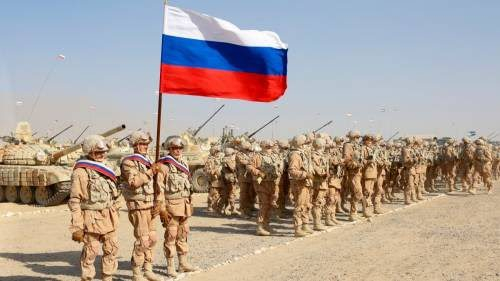Russia increases its influence in the troubled Sahel region of West Africa with military instructors from the country arriving in Niger on Wednesday, public Radio Television du Niger said late Thursday.
Military instructors and personnel from Russia’s defence ministry arrived in Niger on Wednesday, signaling that the West African country is building closer relations with Moscow like its junta-led neighbours.
The military instructors are bringing an air defense system and will train the Nigerien troops, it said in a post on its Facebook page.
In a Thursday broadcast, RTN showed footage of a military cargo plane unloading gear as people in fatigues stood by. It said the deployment followed a recent agreement between Niger’s junta and Russian President Vladimir Putin to boost cooperation.
“We are here to train the Nigerien army … (and) to develop military cooperation between Russia and Niger,” said a man in camouflage uniform. Russia had agreed to install an anti-aircraft system in Niger. “Our airspace will now be better protected.”
Russia, first through Kremlin-backed Wagner Group mercenaries and now through the creation of the Africa Corps, has been extending its influence in countries in Africa including Mali and the Central African Republic.
Like Mali, which is also ruled by the military, Niger is fighting jihadists and has rejected help from former colonial power France, which had troops in both countries.
The arrival of Russian instructors follows Niger’s decision in mid-March to revoke its military accord with the United States that had allowed Pentagon personnel to operate on its soil out of two bases, including a drone base it built at a cost of more than $100 million.
Since 2020, a string of military coups in Niger and neighbouring Mali and Burkina Faso have followed a similar playbook and reshaped international efforts to curb a decade-old fight with Islamist insurgents linked to Al Qaeda and Islamic State.
The three juntas have ended military deals with longstanding allies including France, fostered closer ties with Russia, and formed their own cooperation pact known as the Alliance of Sahel States (AES).
Last December, Russia and Nigér agreed to strengthen their military cooperation, as the West African country faces a security and political crisis following a coup in July. A Russian delegation led by the deputy defence minister met with Niger’s military leaders in Niamey, in the first official visit by a member of the Russian government since the army ousted the civilian government of President Mohamed Bazoum.
The visit comes as Russia seeks to expand its influence and presence in Africa, especially in the Sahel region, where it has already established close ties with Mali, Niger’s neighbour and main ally. Russia has been providing military and technical assistance to Mali, as well as supporting its development projects in the fields of energy, transport and mining. Russia has also been involved in the Central African Republic and Sudan, where it has deployed the Wagner Group, a paramilitary group funded by the Russian state, to provide security and training for local forces.
Meanwhile, the U.S. military’s drone program in Nigér have been significantly disrupted following the recent coup that resulted in the closure of the country’s airspace. The base at the center of this disruption, known as “Nigérien Air Base 201,” was constructed at a considerable cost of $110 million, featuring a 6,200-foot runway tailored to accommodate MQ-9 Reapers and manned aircraft.
In March, the junta in Niger officially ended a military agreement that allowed the deployment of US personnel within its borders. This decision was announced on a Saturday, coinciding with a week of intense discussions between a visiting delegation from Washington and Niger’s military leaders.
The terminated agreement had previously enabled the United States to utilize a base in Niger for monitoring jihadist activities across the region. However, the junta’s latest action aligns with its recent pivot towards Russia and follows the expulsion of French troops in December.
Colonel Amadou Abdramane, the military spokesperson for Niger, delivered a potent statement on national television, declaring the US presence in Niger as “illegal” and a violation of “constitutional and democratic rules.” He emphasized the necessity for the sovereign people of Niger to be consulted on foreign military installations on their land.
The immediate impact of the airspace closure is the diminished visibility of the U.S. military over the Sahel region of Africa, where the presence of ISIS and al-Qaida’s affiliate, Jama’at Nusrat al-Islam wal-Muslimin (JNIM), is pronounced.
Russia has also recently sent 100 military personnel to Burkina Faso, the first significant deployment of Russian troops to the West African country, which has been rocked by a coup and a jihadist insurgency.



